The Nightmare Collection / Bruce Boston
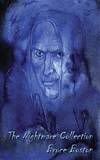 Dark Regions Press / August 2008
Dark Regions Press / August 2008
Reviewed by: Rich Ristow
No ideas but in things, William Carlos Williams once famously wrote in his long collage poem Patterson. Over the years, the idea has morphed into the creative writing workshop mantra of Show, don’t tell. Still, it’s important to consider Williams, even all these decades after his passing. For all the possibilities of lyric poetry, things are more interesting than emotions. Without things, a poem just becomes a raw bundle of feeling, and who finds that interesting, other than the novice who scribbled it? It’s like the failure of a would-be performance /slam poet, in Huntington, West Virginia (who shall remain nameless), who had nothing really interesting to say, so he just pranced around a stage shouting, Fuck you, you fucking fuck! His sloppy rhyme on uck sounds didn’t help his case either. It should be an eternal rule of poetry: never rhyme “fucking fuck” with “flat billed duck.” True, one can’t have a lyric poetry devoid of emotion, but it’s the things that ground the reader and give emotion context. This is something that largely transcends most poetic genres. Classical, new formalist, contemporary free-verse – most good poetry is grounded in something tactile. How it’s grounded leads to the various content descriptions out there, like speculative poetry.
That leads to something else, inevitably. Speculative poetry is not a formal genre, just like “feminist poetry” and “African American poetry” are not formal genres. Those words are mere content labels, and not a description of aesthetic nuts and bolts. Marilynn Hacker’s metrics is just as feminist as Adrienne Rich’s free verse. Claude McKay was just as African-American as Langston Hughes or Reginald Shepard – the three, in terms of prosody, almost live on different planets. Which brings me, rather nicely, back to speculative poetry. One could play the game of comparison, but for the sake of ease, it just might be easier to point to Bruce Boston’s The Nightmare Collection.
The book absolutely contains speculative content, and while there are certain constructive qualities that thread their way through the collection, there’s no über Bruce Boston poem. He sometimes writes in rhyme, and other times in free verse or poetic prose. This isn’t a case of a writerly multiple personality disorder. One gets the sense that Boston approaches issues of form the way a mechanic or carpenter approaches their tool kit. Instead of sticking to one approach, Boston merely uses what works for him.
Sometimes, Boston writes like an early Williams, long before the collage poetics of Patterson. Poems like “Dark Gourmet,” “Bone People,” and “White Whale” narrowly stretch down the page with short lines and stanza breaks making ample use of the white space around. Each concrete line spells out a thought or image building to the end, where everything locks together nicely. In other places, Boston is more comfortable with prose, like in “Interrogation at City Gate,” “Futurity Wears The Head,” and “Cold Letter to the Children.” These poems benefit from the longer, more prosaic line, and had Boston used stripped-down lineation, they wouldn’t work.
There are also works that employ rhyme in The Nightmare Collection, but all this talk of form is more a mere exploration of Boston’s uses of different organizational principles. A speculative nature is consistent throughout. Most obviously, it comes across in a series of variations that open with “If _______ / where the world.” For example:
If cockroach people
were the world
our population would
multiply unchecked,
Also:
If lice people
were the world
we would cultivate
vast fields of flesh,
There are many others within the collection that start with conjecture and then moves on to envision the resulting implications. Boston speculates on, among others crow people, cat people, werewolves, and, as shown above, cockroach and lice people. The spirit of speculation carries one, but not every poem within The Nightmare Collection fits the opening formula of the mentioned variations.
There’s work here that reads like comes straight from the bizarro camp. (Honestly, “vast fields of flesh” struck me, personally, as a happy coincidence, as I’ve recently been reading Carlton Mellick III’s Teeth and Tongue Landscape) “Surreal Births” details a woman giving birth to a dog, and they afterbirth comes in the form puppy chow. There’s also Boston’s sense of humor, like in “Avocado Horror” which starts off praising the green fruit, but then ends up using it as a garnish for cannibalism.
Certain elements of craft do transcend the issue of shape and assist the sense of speculation. It doesn't matter whether Boston rhymes, alliterates in free verse, or employs the poetic sentence. There's a strong sense of clarity within The Nightmare Collection. Again, this comes back to Williams famous little dictum. The collection bristles with things. Vivid imagery abounds, which is fundamentally needed. Speculation is an abstract action. Without grounding the reader, in, say, Boston's “Surreal Office” where the arm rests are arms and the sofa is a lap, the poetry would just be a loose bundle of ideas, and that would be boring – as boring as a collection where the writer was more concerned with communicating their feelings than speaking a language of evocative imagery. Boston does what any successful speculative poet should do. He puts the reader in weird, strange, landscapes; he gives a visual context for his ideas. In the end, it makes for a wild ride.
Purchase The Nightmare Collection by Bruce Boston.
Serial / J.A. Konrath and Blake Crouch
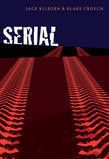 Grand Central Publishing / May 2009
Grand Central Publishing / May 2009
Reviewed by: Martel Sardina
As horror fans, we should all know by know that offering a ride to or accepting a ride from a stranger is never a good idea. Stories fall into to two categories: the hitchhiking psychopath who takes advantage of an unsuspecting Good Samaritan or the naive hitchhiker who accepts a ride from a nefarious stranger. But what if the hitchhiking psychopath accepted a ride from a nefarious stranger? In the novella Serial, Konrath and Crouch combine the best of both worlds to give readers a story they won’t soon forget.
Donaldson is a serial killer who is starting to wonder if pursuing hitchhikers as victims is even worth the trouble anymore. Finding potential victims is getting tougher all the time. Delayed gratification takes the fun out of the game. But maybe his luck is improving. Shortly after disposing of his latest victim, Donaldson sees Lucy, a pretty young thing waving her up turned thumb in his direction. Should he give her a lift? Or does he know enough to realize this opportunity is too good to be true?
Konrath and Crouch collaborated on Serial in part to give readers a sampler of their respective works. Konrath writes the Lt. Jack Daniels mystery series and recently released his first horror novel, Afraid, under the pen name Jack Kilborn. Crouch’s first two novels feature Andy Thomas, a suspense writer who gets pulled into a nightmarish world worse than the ones he writes about. His forthcoming novel, Abandon, is about a mining town in the Colorado mountains that vanishes in 1893.
An interview with the authors and excerpts from Afraid and Abandon are included in this free e-book (for Kindle or Kindle for iPhone).
Download Serial by J.A. Konrath and Blake Crouch.
All the Pretty Dead Girls / John Manning
 Pinnacle Books / April 2009
Pinnacle Books / April 2009
Reviewed by: Rick R. Reed
Synopsis: One By One...
Two decades ago, at a private women's college in upstate New York, a student was brutally attacked in her dorm room. Her assailant was never found...
They Disappear...
Sue Barlow arrives at Wilbourne College twenty years later. When a classmate disappears, Sue thinks it's an isolated incident. But then two other girls vanish...
And Die...
As fear grows on campus, Sue begins to sense she's being watched. And as the body count rises, she soon realizes that a twisted psychopath is summoning her to play a wicked game - a game that only will end when she dies.
Review: I’m in a quandary over this review. How can I put this without sounding like a fool?
I heartily enjoyed John Manning’s All the Pretty Dead Girls.
I didn’t really think All the Pretty Dead Girls was a very good book.
So now I’m having brain cramps trying to reconcile these two statements. My scalp itches. Perhaps it’s best to say that All the Pretty Dead Girls is a guilty pleasure: maybe not so good for you, but oh, what fun it is to consume.
Positioned as a thriller by Pinnacle (a division of Kensington), All the Pretty Dead Girls is really more of a horror story about the coming end days, as told in the Book of Revelations (though, if you read Manning’s book, you’ll discover that the Church has hidden the real Book of Revelations, cue Da Vinci Code theme music here). Manning gives the story a kind of whacky twist and makes the antichrist an unassuming, unaware and very demure college girl. We share in her journey of self-discovery, although I would hesitate to say “you’ll see yourself here” on that journey. Along the way, our heroine Sue—even her name is white bread—uncovers the fact that she was fathered by Satan, the grandparents who raised her and most of the people around her are in league with the Dark One and can’t wait to see Sue realize her destiny as evil incarnate, and she gets flashes of her wicked self showing up unexpectedly, which usually entail saying hateful things to people like her roommate (which really aren’t all that different from what teenage girls have been saying to each other for years, anyway).
But damned if you don’t like Sue and root for her on her journey, hoping that her “human” side will win out (she is mixed race: human and devil) in the end and world order will be maintained. The book is expertly plotted and Manning is facile at manipulating readers to keep turning the pages.
Taking heavy inspiration from Rosemary’s Baby and The Omen, Manning has crafted a cheesy, yet very readable horror story that, for all my nose-in-the-air reservations, will grab you from the very first sentence and carry you through on a torrent of suspense. With the campy appearance of characters like an Ann Coulter-like friend of the family (and why even bother to mask the fact that Coulter is in league with the devil?), All the Pretty Dead Girls is sublimely readable, perfect for throwing in the beach bag this summer. By turns, it should creep you out and make you giggle at its preposterous and derivative storyline.
Bottom line, would I read more of John Manning’s work? Yes, in a heartbeat. Do I recommend you do? Yes, in a heartbeat. Do I think Manning will give horror heavyweights like Clive Barker or Stephen King a run for their money? Only if the antichrist intervenes.
Purchase All the Pretty Dead Girls by John Manning
Columnist Rick R. Reed is the author of ten novels and has short fiction in more than twenty anthologies. He lives in Seattle, WA. Find out more about the author at his website.
The Unseen / Alexandra Sokoloff
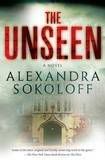 St. Martin’s Press / May 2009
St. Martin’s Press / May 2009
Reviewed by: Vince A. Liaguno
Poltergeists and parapsychology take center stage in Alexandra Sokoloff’s third novel, The Unseen. Caution: Falling rocks and ghostly eroticism ahead.
Dr. Laurel MacDonald, a young psychology professor on the run from heartbreak and betrayal, takes a teaching post at Duke University. For the California transplant, Durham, North Carolina is a bit of a culture shock – from the old southern customs and laid back ways of the people to the colorful change of seasons and reconnection with distant relatives. With the “publish or perish” aspect of her new university gig looming, MacDonald stumbles upon the newly released files from the world-famous Rhine parapsychology experiments – during which Dr. Rhine and his researchers scientifically proved the existence of ESP - and reluctantly teams up with a handsome colleague to replicate a poltergeist investigation from 1965. Unbeknownst to MacDonald and company – which includes Dr. Brendan Cody and two gifted students – the 1965 haunted house investigation ended with members of the original research team either dead or insane. Before you can say The Legend of Hell House, the mirrors are shattering, the sexual tension is crackling, and rocks are falling from the sky in this fast-paced, well-executed supernatural thriller.
The Unseen builds upon the best elements of Sokoloff’s two previous novels – 2006’s The Harrowing and last year’s The Price – to create a hybrid third effort. Like The Harrowing, we’re back in a college setting – this time Duke University – and seemingly dealing with angry spirits. But, like in The Price, Sokoloff casts doubts on whether the spooky doings at hand are paranormal or just normal – or perhaps a combination of the two:
The knocking started again. This time it was downstairs, muffled…curiously, the sound seemed the exact same distance away. Slow, steady thumps.
Listening to it, all of Laurel’s suspicions about a human source fled her. She could feel in her marrow – this was other. It was mind-shattering, soul-shattering. Her whole body was in revolt against the essential wrongness of it, the irrationality, the impossibility. She could feel the same reaction in the other three; they all stood still and poised in disbelief, in outrage, in awe.
It’s in her ability to keep readers straddling this literary tightrope that Sokoloff achieves her greatest level of success in creating genuine supernatural suspense.
Throughout The Unseen, Sokoloff’s screenwriting background is evident – to mostly positive effect. The novel chugs along like a well-edited hour and a half film, with perfectly placed peaks and valleys in the action and dialogue that’s script-ready. At times, the novel feels so much like a Hollywood screenplay that one half expects to see stage directions; fortunately, Sokoloff knows a thing or two about balance and such feelings of cinematic composition are fleeting. Literary prowess adequately dismisses Hollywood sensibility, for example, whenever Sokoloff juxtaposes the colorless, fast-paced Californian landscape against the drawling, textured old money world of North Carolina. Potential versus privilege.
The characters are casting agent friendly (one can almost see Kate Hudson or Melissa George stepping in to play MacDonald, Ryan Reynolds or Jake Gllyenhaal in the Cody role) with likeability quotients kept high – even the unlikable characters possess nothing more than a few minor personality flaws. Unlike previous efforts, it’s her supporting players that shine here. Tyler Mountford, one of the two Duke students selected to tag along on the investigation, practically oozes sexuality and southern charm right off the pages with his “Cheshire cat smile” and the “slouch in his hips,” while Katrina DeVore (who jumps off the page as a young Christina Ricci) is impeccably rendered in all her southern Gothic girl-meets-privilege moodiness.
With The Unseen, Sokoloff establishes herself as a leader among the horror-thriller hybrid crowd. She knows just when to chill, and just when to thrill. It’s the perfect temperature for a genre climate in which the horror novel is lukewarm at best and the thriller is hot – the ideal conditions to create a perfect storm of sales and suspense.
Purchase The Unseen by Alexandra Sokoloff.
Dark Places / Gillian Flynn
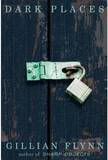 Shaye Areheart Books / May 2009
Shaye Areheart Books / May 2009
Reviewed by: Martel Sardina
The cover of Gillian Flynn’s debut novel Sharp Objects piqued my interest when I saw it on the shelf at my local library. While I don’t usually judge a book by its cover, the image of a razor blade on a black background reminded me of one of my favorite metal albums, Judas Priest’s British Steel — which in and of itself warranted a quick glance at the dust jacket copy and blurbs. The premise interested me enough to give Flynn a try.
To say that I liked her debut would be an understatement. I raved about it then and have been waiting (im)patiently for Ms. Flynn to hurry up and put out something new. After nearly three years, Dark Places is finally here. The question is: was it worth the wait?
When Flynn introduces Libby Day, the reader is immediately sympathetic toward her. When Libby was seven, her mother and two sisters were brutally murdered. Libby witnessed the murders and managed to escape into the harsh January night, losing a couple of toes in the process.
Libby is in her thirties now, still living in the shadow of her past. She’s depressed, out of work, and just learned that her trust fund has run out. She’s so caught up in the life that was taken from her, that she can barely function is the life that she has. She doesn’t have many family members to turn to for help. Her father, Runner, is a deadbeat. Her Aunt Diane isn’t speaking to her. And her only other relative – her brother Ben – has been in jail since that fateful night. Libby’s eyewitness testimony put him there.
When Libby receives a letter requesting a public speaking engagement, she agrees thinking it will be a way to make some quick cash. Lyle, the event’s organizer, assures Libby that it will be a pleasant evening and all she’ll have to do is answer a few questions from a group of people who have spent the last twenty odd years following her case. Libby expects to be speaking to a group of sympathizers and is shocked when audience members have the audacity to suggest that her brother is innocent. They claim to have proof, telling Libby that the prosecution tricked her into identifying Ben as the murderer. Trouble is, Libby was there that night. They weren’t.
Libby leaves the event angry. Lyle apologizes and begs her to look at the group’s files. To merely consider the possibility that she was wrong. Libby isn’t interested in revisiting the details of that horrible night until she learns that members of Lyle’s group are willing to pay her handsomely to scare up old ghosts.
At first, Libby is motivated by greed. But as she starts digging deeper, talking to people from her past, the details aren’t fitting together quite as nicely as they did when she was seven. She begins to doubt Ben’s guilt and wants to know what really happened that night.
What follows is the unraveling of great mystery. Flynn keeps the reader turning pages by alternating viewpoint characters and timelines. While most of the narrative is focused on Libby in the present, Flynn also gives readers glimpses into the past, relaying the events leading up to the murders from Ben’s (as a teenager) and their now-deceased mother’s point of view.
Flynn’s writing is brutal. Some criticize her for writing about unlikable people. I won’t take her to task for that. As a reader and a reviewer, I want characters that are believable. I don’t have to like them as people. But I do have to believe in them, believe in the motivations for their actions. Flynn succeeds on both counts.
If nothing else, Dark Places certainly lives up to its name.
Purchase Dark Places by Gillian Flynn.
The Adventures of Mr. Maximillian Bacchus and His Travelling Circus / Clive Barker
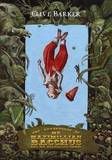 Bad Moon Books / March 2009
Bad Moon Books / March 2009
Reviewed by: Blu Gilliand
It’s difficult to offer any sort of critique of Clive Barker’s The Adventures of Mr. Maximillian Bacchus and His Travelling Circus. It’s not that there aren’t things to be critical about. It’s that any mistakes, heavy-handedness or clumsiness in the prose have the built-in excuse of having been made when the author was just a teenager feeling his way around the craft of setting his dreams to paper.
You’ve got to hand it to Barker for having the courage to put this early work out there — warts and all. The temptation to go back in to tinker and polish must have been difficult to resist for someone like Barker, famous as he is for the multiple handwritten drafts and rewrites that are part of his process. But Circus has been left as-is, and while it’s not as satisfying as Barker’s more mature work, it’s an intriguing peek at an early draft of the talent that was to come.
Circus is composed of a quartet of tales following the titular caravan as it makes its way to Xanadu, where Mr. Bacchus hopes to stage a show for the famous Kublai Khan. As they travel dusty side roads that carry them from sleepy towns to the very ends of the Earth itself, they pick up several bizarre companions to complement a troupe that already contains its share of clowns, trapeze artists, and even a talking crocodile. There is a wedding, a run-in with pirates, and even the theft of the Sun itself.
Barker’s love of language is on display in this early work, even though his eventual mastery of it has yet to show itself in these stories. While there is a definite gap in his craftsmanship from then to now, the brute force of his imagination is on full display. His characters and settings in Circus are a rich foretelling of the worlds he would go on to build in his books.
The weaknesses of a teenage author may be too much for anyone other than Barker purists to withstand, and this is definitely not the book to give someone looking for a first impression. But for those who have followed Barker’s vivid storytelling since he shocked the world with Books of Blood, this small collection is a wonderful thing to have.
Purchase Clive Barker’s The Adventures of Mr. Maximillian Bacchus and His Travelling Circus.
Hater / David Moody
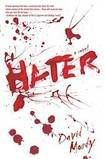 St. Martin’s Press / December 2008
St. Martin’s Press / December 2008
Reviewed by: Rick R. Reed
Synopsis: One day you’re heading to work, playing with the kids, kissing the wife goodnight, the next day you’re a killer.
It occurs without warning — sudden, vicious, and lethal attacks. Why are people attacking their friends, their family, even complete strangers? Is it a virus, or is it a terrorist attack, or is it something more primal? An overwhelming terror has gripped the country and there’s no one to trust — not even yourself.
Review: David Moody’s Hater took something of an unusual path to mainstream publication. Moody self-published the book and sold the film rights to Pan’s Labyrinth director Guillermo del Toro without an agent. And then, a mainstream publisher like St. Martin’s came along, recognized Moody’s brilliance, and snatched up not only Hater, but also a mini cottage industry of Moody horror novels.
Moody is the real deal when it comes to horror and it’s no surprise he is hitting the big time with this novel. Moody does what the best horror writers do: set you down in a familiar world, and then turn it upside down, building suspense and dread relentlessly. Hater is tortuously good stuff, impossible to put down, revolting in the best way, and a thought-provoking commentary on our times.
Hater is about a virus? plague? evolutionary shift? that begins occurring without warning and on a widespread, global scale. People are suddenly filled with rage, adrenalin-fueled strength, and an indomitable desire to kill. It doesn’t take long for the world to be reduced to a martial-law state, where it’s haters against the rest of the world, a “rest” whose numbers are rapidly dwindling. The book kind of echoes some of the best end-of-the-world scenarios like Richard Matheson’s I Am Legend and Romero’s Dead series, but goes further and is even better, I think, than those iconic masterpieces.
Why? Because Hater is a bit of a mind-fuck and Moody doesn’t hesitate to paint his apocalyptic canvas in frightening tones of gray. See, we go along, blissfully thinking that the people like us are the good guys and the out-of-control haters are the bad ones. But Moody pulls that comforting rug out from under us and foreshadows it in a scene when our main character, everyman Danny McCoyne, comes across an upstairs neighbor dying in the vestibule. Danny assumes the man was the victim of a hater, until the man tells him, “You see everything so clearly when it happens to you…It’s them, mate…not us. They’re the ones who hate. Get yourself ready.”
Moody raises provocative questions and I won’t spoil the edge-of-your-seat plotline by going into too much detail, but suffice it to say that who are the haters and who are the hated become identifications that are open to debate. And that makes Hater unique and a book that sticks with a reader long after he or she has closed the book.
Moody is smart, setting Hater down in a very real world (what seems to be a modern, industrial British city, but which could be anywhere, which is exactly the point) and making its protagonist someone who could easily be our neighbor, relative, or friend…or ourselves. I think the scariest stories are those that aren’t set in some fantastic universe, but ones that take place under the bright light of day, in a world that’s right under out noses.
Those stories are the most real and thus, the most horrifying.
Hater is the first of a trilogy. I can’t wait for the other books…and to get my hands on more of Moody’s crazy-good horror.
Purchase Hater by David Moody.
Columnist Rick R. Reed is the author of ten novels and has short fiction in more than twenty anthologies. He lives in Seattle, WA. Find out more about the author at his website.




